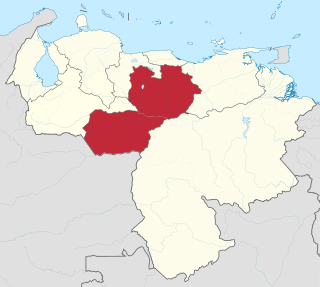San Fernando may refer to:

Apure State is one of the 23 states of Venezuela. Its territory formed part of the provinces of Mérida, Maracaibo, and Barinas, in accordance with successive territorial ordinations pronounced by the colonial authorities. In 1824 the Department of Apure was created, under jurisdiction of Barinas, which laid the foundations for the current entity. In 1856 it separated from Barinas and for the first time Apure appeared as an independent province, which in 1864 acquired the status of state. In 1881, however, a new territorial division combined Apure and Guayana to form a single state named Bolívar. In 1899 it reestablished its autonomy and finally, by means of the Constitution of 1909, gained its current borders.
Amparo Muñoz y Quesada was a Spanish actress, model and beauty queen who won the Miss Universe 1974 competition in Manila, Philippines, being the first and only Spaniard Miss Universe titleholder to date.

San Fernando de Apure is a city in Apure State in Venezuela. The population of the municipality area is 165,135. The 18th century exports included heron feathers and animal hides.
El Porvenir or Porvenir may refer to:

The Goya Award for Best Actress is one of the Goya Awards, Spain's principal national film awards.

María Amparo Rivelles Ladrón de GuevaraMML, better known as Amparo Rivelles, was a Spanish actress.
Amparo, a Portuguese and Spanish word meaning refuge, shelter, or protection, may refer to:

Páez is one of the seven municipalities (municipios) that makes up the Venezuelan state of Apure and, according to the 2011 census by the National Institute of Statistics of Venezuela, the municipality has a population of 100,125. The town of Guasdualito is the municipal seat of the Páez Municipality.

Miss Universe 1975 was the 24th Miss Universe pageant, held on 19 July 1975 at the National Gymnasium in San Salvador, El Salvador. Anne Marie Pohtamo won the title for Finland, thus making her the second Finnish woman to win the Miss Universe crown after Armi Kuusela, who was the first Miss Universe winner, in 1952. After Spain's Amparo Muñoz resigned the previous year, her successor was crowned by Miss Universe 1972, Kerry Anne Wells of Australia.
The Massacre of El Amparo was a massacre of 14 fishermen which took place near the village of El Amparo, in Venezuela's western state of Apure, on 29 October 1988.

María Amparo Noguera Portales, is a Chilean television, theatre and film actress.

The Federal Constitution of the United Mexican States of 1857, often called simply the Constitution of 1857, was the liberal constitution promulgated in 1857 by Constituent Congress of Mexico during the presidency of Ignacio Comonfort. Ratified on February 5, 1857, the constitution established individual rights, including universal male suffrage, and others such as freedom of speech, freedom of conscience, freedom of the press, freedom of assembly, and the right to bear arms. It also reaffirmed the abolition of slavery, debtors' prisons, and all forms of cruel and unusual punishment such as the death penalty. The constitution was designed to guarantee a limited central government by federalism and created a strong national congress, an independent judiciary, and a small executive to prevent a dictatorship. Liberal ideals meant the constitution emphasized private property of individuals and sought to abolish common ownership by corporate entities, mainly the Catholic Church and indigenous communities, incorporating the legal thrust of the Lerdo Law into the constitution.

The Llanos Region is one of the 10 administrative regions in which Venezuela was divided for its development plans; it comprises the states of Apure and Guárico.

FARC dissidents, also known as Carlos Patiño Front, are a group, formerly part of the Revolutionary Armed Forces of Colombia (FARC), who have refused to lay down their arms after the Colombian peace process came into effect in 2016, or resumed their insurgency afterwards. In 2018, the dissidents numbered some 2,000, to 2,500, armed combatants with an unknown number of civilian militia supporting them. The FARC dissidents have become "an increasing headache" for the Colombian armed forces, as they have to fight them, the Popular Liberation Army (EPL), the National Liberation Army (ELN), and the Clan del Golfo at the same time.
El Amparo is a town located in Páez Municipality, Apure of Venezuela. It is located on the border with Colombia, on the banks of the Arauca River.
Events from the year 1988 in Venezuela

The 2021 Apure clashes started on 21 March 2021 in the south of the Páez Municipality, in the Apure state in Venezuela, specifically in La Victoria, a location bordering with Colombia, between guerrilla groups identified as Revolutionary Armed Forces of Colombia (FARC-EP) dissidents and the Venezuelan government led by Nicolás Maduro.

El Amparo is a 2016 film directed by Rober Calzadilla and coproduced between Colombia and Venezuela. The film is set in El Amparo, a Venezuelan location on the shores of Arauca River, in the Colombian border, based in the 1988 Massacre of El Amparo, where the Venezuelan army killed several fishermen, accusing them of being Colombian guerillas.











